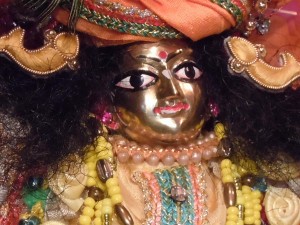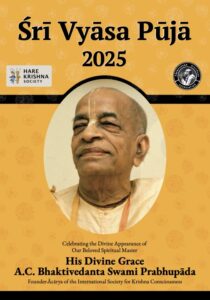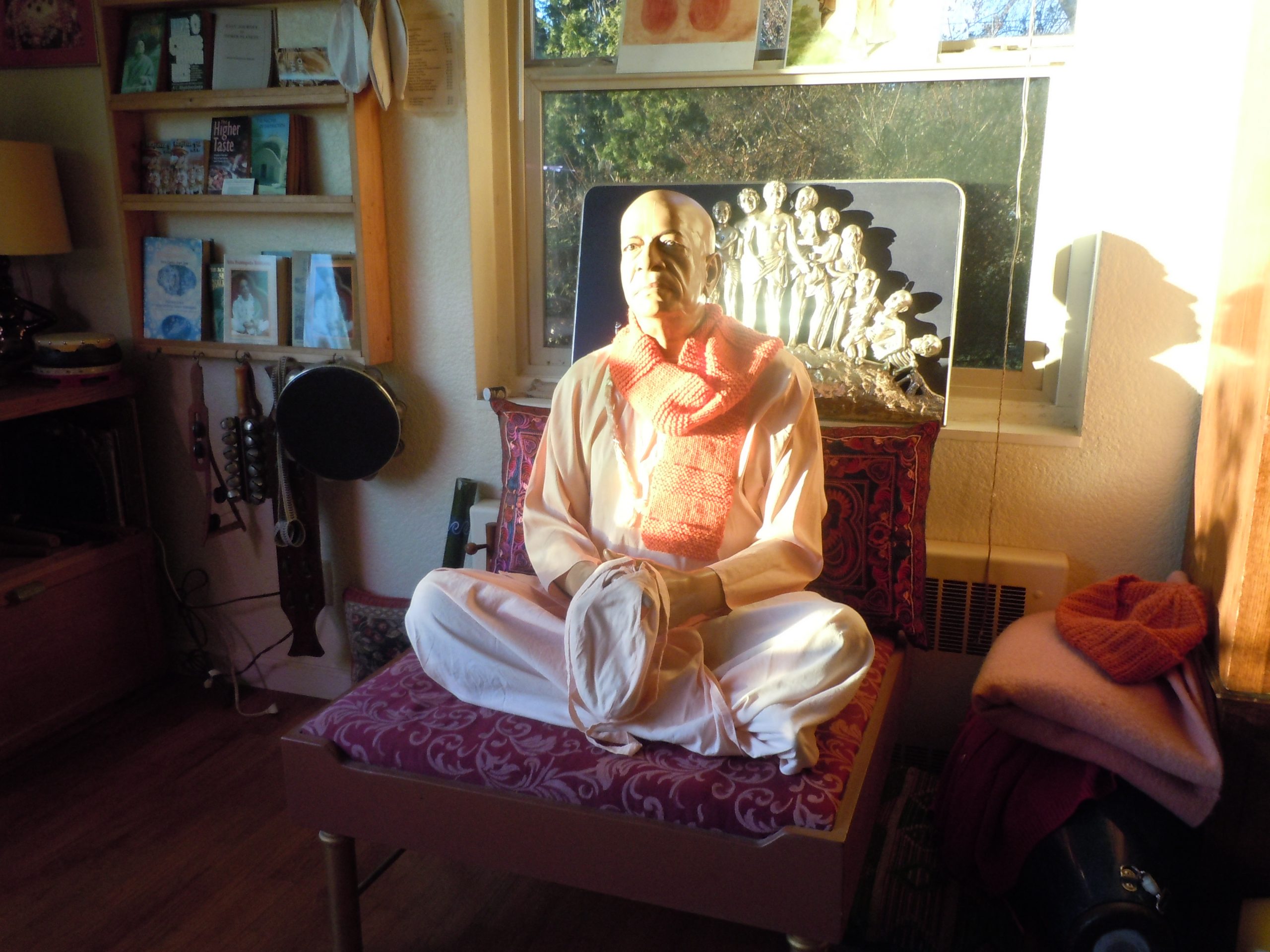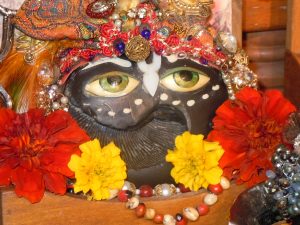Hare Krsna-below we have arranged two topics The first one is some tips given by Srila
Prabhupada, Srila Bhaktisiddhanta Maharaj and Srila Bhaktivinode Thakur on how to chant the Holy Names of God without offense.
The second section is the results one gains by chanting the Lords Holy Names without offense.
Hare Krsna
Damaghosa das
——————————
How to chant Hare Krsna Maha Mantra without offense-some tips from 3 Acaryas
1.) NOD-Chapter13 Caitanya Mahāprabhu has recommended that everyone chant theHare Kṛṣṇa mantra just to cleanse the dust from the heart. If the dust of the heart is cleansed away, then one can actually understand the importance of the holy name. For persons who are not inclined to clean the dust from their heart and want to keep things as they are, it is not possible to derive the transcendental result of chanting the Hare Kṛṣṇamant
|
Second Chance (book on re-incarnation)-chapter on Atonement
2.) Śrīdhara Svāmī says, “Chanting the holy name of Nārāyaṇa, Lord Hari, not only counteracted all of Ajāmila’s sinful reactions, but it made him eligible to become liberated, and therefore at the time of death he was transferred to the spiritual world.” Chanting the holy name of Kṛṣṇa counteracts all sins—more than one can possibly commit. Because Ajāmila had chanted the holy name without offense, and because he chanted sincerely, he completely freed himself from all sinful reactions. This is why we are stressing the chanting of Hare Kṛṣṇa so much. Pious activities, austerity, sacrifice—everything is done simply by chanting the Hare Kṛṣṇamantra. There is no need of any other process of yoga, atonement, or austerity and penance. Simply by chanting without offense
|
The key to successful chanting, therefore, is to carefully avoid sin altogether.By chanting the Hare Kṛṣṇa mahā-mantra, a person is freed from all reactions to his previous sins, and if he avoids sinning again, he very quickly becomes an advanced devotee. His mind becomes fixed upon the lotus feet of Kṛṣṇa. If we regularly chant Hare Kṛṣṇa without offense, we shall remain free from all sinful reaction, and our attachment for the Supreme Lord in devotional service will increase.
3.)Srila Bhaktisiddhanta Maharaj on pg 27 of the book called Siksastaka says..There is indeed a way to escape the steely clutches of namaparadha. One must recognize and isolate the offences conscientiously avoiding them he must then chant continuously.
-
Wear the “trnad api sunicena” manra around ones neck. Which means always be aware of these 4 things while chanting and serving in this world.(be very humble,more tolerant than a tree, devoid of false prestige,and offer proper respect to all)
-
Chant the Siksastaka daily because this will develop one’s love for Krsna. Antya 20.63-65If anyone recites or hears these eight verses of instruction(Siksastaka) bySrīCaitanya Mahāprabhu,(daily) his ecstatic love and devotion for Kṛṣṇa increases day by day. Antya 20.66
RESULTS OF CHANTING WITHOUT OFFENSES.
NoI 5
The chanting of the holy names of Krsna is so sublime that if one
chants the Hare Krsna maha-mantra offenselessly, carefully avoiding
the ten offenses, he can certainly be gradually elevated to the point
of understanding that there is no difference between the holy name of
the Lord and the Lord Himself. One who has reached such an
understanding should be very much respected by neophyte devotees. One
should know for certain that without chanting the holy name of the
Lord offenselessly, one cannot be a proper candidate for advancement
in Krsna consciousness. In Sri Caitanya-caritamrta (▼Madhya 22.69) it
is said:
The chanting of the holy names of Krsna is so sublime that if one
chants the Hare Krsna maha-mantra offenselessly, carefully avoiding
the ten offenses, he can certainly be gradually elevated to the point
of understanding that there is no difference between the holy name of
the Lord and the Lord Himself. One who has reached such an
understanding should be very much respected by neophyte devotees. One
should know for certain that without chanting the holy name of the
Lord offenselessly, one cannot be a proper candidate for advancement
in Krsna consciousness. In Sri Caitanya-caritamrta (▼Madhya 22.69) it
is said:
yahara komala sraddha, se ‘kanistha’ jana
krame krame tenho bhakta ha-ibe ‘uttama’
krame krame tenho bhakta ha-ibe ‘uttama’
“One whose faith is soft and pliable is called a neophyte, but by
gradually following the process, he will rise to the platform of a
first-class devotee.” Everyone begins his devotional life from the
neophyte stage, but if one properly finishes chanting the prescribed
number of rounds of harinama, he is elevated step by step to the
highest platform, uttama-adhikari. The Krsna consciousness movement
gradually following the process, he will rise to the platform of a
first-class devotee.” Everyone begins his devotional life from the
neophyte stage, but if one properly finishes chanting the prescribed
number of rounds of harinama, he is elevated step by step to the
highest platform, uttama-adhikari. The Krsna consciousness movement
prescribes sixteen rounds daily because people in the Western
countries cannot concentrate for long periods while chanting on beads.
Therefore the minimum number of rounds is prescribed. However, Srila
Bhaktisiddhanta Sarasvati Thakura used to say that unless one chants
at least sixty-four rounds of japa (one hundred thousand names), he is
considered fallen (patita). According to his calculation, practically
every one of us is fallen, but because we are trying to serve the
Supreme Lord with all seriousness and without duplicity, we can expect
the mercy of Lord Sri Caitanya Mahaprabhu, who is famous as
patita-pavana, the deliverer of the fallen.
countries cannot concentrate for long periods while chanting on beads.
Therefore the minimum number of rounds is prescribed. However, Srila
Bhaktisiddhanta Sarasvati Thakura used to say that unless one chants
at least sixty-four rounds of japa (one hundred thousand names), he is
considered fallen (patita). According to his calculation, practically
every one of us is fallen, but because we are trying to serve the
Supreme Lord with all seriousness and without duplicity, we can expect
the mercy of Lord Sri Caitanya Mahaprabhu, who is famous as
patita-pavana, the deliverer of the fallen.
————————–
Adi 8.16 The Author Receives the Orders of Krsna
One must come to the understanding that the holy name of the Lord
and the Supreme Personality of Godhead Himself are identical. One
cannot reach this conclusion unless one is offenseless in chanting the
holy name. By our material calculation we see a difference between the
name and the substance, but in the spiritual world the Absolute is
always absolute; the name, form, quality and pastimes of the Absolute
are all as good as the Absolute Himself. As such, one is understood to
be an eternal servant of the Supreme Personality of Godhead if he
considers himself an eternal servant of the holy name and in this
spirit distributes the holy name to the world. One who chants in that
spirit, without offenses, is certainly elevated to the platform of
understanding that the holy name and the Personality of Godhead are
identical. To associate with the holy name and chant the holy name is
to associate with the Personality of Godhead directly.
One must come to the understanding that the holy name of the Lord
and the Supreme Personality of Godhead Himself are identical. One
cannot reach this conclusion unless one is offenseless in chanting the
holy name. By our material calculation we see a difference between the
name and the substance, but in the spiritual world the Absolute is
always absolute; the name, form, quality and pastimes of the Absolute
are all as good as the Absolute Himself. As such, one is understood to
be an eternal servant of the Supreme Personality of Godhead if he
considers himself an eternal servant of the holy name and in this
spirit distributes the holy name to the world. One who chants in that
spirit, without offenses, is certainly elevated to the platform of
understanding that the holy name and the Personality of Godhead are
identical. To associate with the holy name and chant the holy name is
to associate with the Personality of Godhead directly.
——————————
TLK Vs 25-26 Association with the Supreme Lord 180503/530501
Unless one is advanced in krsna-prema, love of Krsna, he cannot see
or understand. By the blunt material senses, we cannot even understand
the name of Krsna. People are always asking, “Why are these people
chanting Hare Krsna?” They cannot understand, although Krsna
realization begins with the name. The name of Krsna and Krsna are
nondifferent, but we cannot realize this intellectually. We have to
practice chanting Hare Krsna to realize it. When we actually advance
in devotional service and chant the Hare Krsna maha-mantra
offenselessly, we will realize that Krsna and His name are
nondifferent.
Unless one is advanced in krsna-prema, love of Krsna, he cannot see
or understand. By the blunt material senses, we cannot even understand
the name of Krsna. People are always asking, “Why are these people
chanting Hare Krsna?” They cannot understand, although Krsna
realization begins with the name. The name of Krsna and Krsna are
nondifferent, but we cannot realize this intellectually. We have to
practice chanting Hare Krsna to realize it. When we actually advance
in devotional service and chant the Hare Krsna maha-mantra
offenselessly, we will realize that Krsna and His name are
nondifferent.
——————————
SB 1.18.19 P Maharaja Pariksit Cursed by a Brahmana Boy 13667/530501
Srimad-Bhagavatam asserts that one who chants the holy name of the
Lord under the direction of a pure devotee can at once get free from
the disadvantages due to a lower-caste birth. A pure devotee of the
Lord does not commit any offense while chanting the holy name of the
Lord. There are ten different offenses in the chanting of the holy
name of the Lord. To chant the holy name under the direction of a pure
devotee is offenseless chanting. Offenseless chanting of the holy name
of the Lord is transcendental, and, therefore, such chanting can at
once purify one from the effects of all kinds of previous sins. This
offenseless chanting indicates that one has fully understood the
transcendental nature of the holy name and has thus surrendered unto
the Lord. Transcendentally the holy name of the Lord and the Lord
Himself are identical, being absolute. The holy name of the Lord is as
powerful as the Lord. The Lord is the all-powerful Personality of
Godhead, and He has innumerable names, which are all nondifferent from
Him and are equally powerful also. In the last word of the
Bhagavad-gita the Lord asserts that one who surrenders fully unto Him
is protected from all sins by the grace of the Lord. Since His name
and He Himself are identical, the holy name of the Lord can protect
the devotee from all effects of sins.
Srimad-Bhagavatam asserts that one who chants the holy name of the
Lord under the direction of a pure devotee can at once get free from
the disadvantages due to a lower-caste birth. A pure devotee of the
Lord does not commit any offense while chanting the holy name of the
Lord. There are ten different offenses in the chanting of the holy
name of the Lord. To chant the holy name under the direction of a pure
devotee is offenseless chanting. Offenseless chanting of the holy name
of the Lord is transcendental, and, therefore, such chanting can at
once purify one from the effects of all kinds of previous sins. This
offenseless chanting indicates that one has fully understood the
transcendental nature of the holy name and has thus surrendered unto
the Lord. Transcendentally the holy name of the Lord and the Lord
Himself are identical, being absolute. The holy name of the Lord is as
powerful as the Lord. The Lord is the all-powerful Personality of
Godhead, and He has innumerable names, which are all nondifferent from
Him and are equally powerful also. In the last word of the
Bhagavad-gita the Lord asserts that one who surrenders fully unto Him
is protected from all sins by the grace of the Lord. Since His name
and He Himself are identical, the holy name of the Lord can protect
the devotee from all effects of sins.
—————————-
Madhya 19.177 Lord Sri Caitanya Mahaprabhu Instructs 137373/530501
The process of devotional service-beginning with chanting and
hearing-is called sadhana-bhakti. This includes the regulative
principles that are intended to awaken one to devotional service.
Devotional service is always dormant in everyone’s heart, and by the
offenseless chanting of the holy names of the Lord, one’s original
dormant Krsna consciousness is awakened. This awakening to Krsna
consciousness is the beginning of sadhana-bhakti. This can be divided
into many different parts, including faith, association with devotees,
initiation by the spiritual master, engagement in devotional service
under the instructions of a spiritual master, steadiness in devotional
service and the awakening of a taste for devotional service. In this
way, one can become attached to Krsna and His service, and when this
attachment is intensified, it results in ecstatic love for Krsna.
The process of devotional service-beginning with chanting and
hearing-is called sadhana-bhakti. This includes the regulative
principles that are intended to awaken one to devotional service.
Devotional service is always dormant in everyone’s heart, and by the
offenseless chanting of the holy names of the Lord, one’s original
dormant Krsna consciousness is awakened. This awakening to Krsna
consciousness is the beginning of sadhana-bhakti. This can be divided
into many different parts, including faith, association with devotees,
initiation by the spiritual master, engagement in devotional service
under the instructions of a spiritual master, steadiness in devotional
service and the awakening of a taste for devotional service. In this
way, one can become attached to Krsna and His service, and when this
attachment is intensified, it results in ecstatic love for Krsna.
—————————–
Madhya 25.199 How All the Residents of Varanasi Became 149099/530501
Sri Caitanya Mahaprabhu further advised Subuddhi Raya: “Begin
chanting the Hare Krsna mantra, and when your chanting is almost pure,
all your sinful reactions will go away. After you chant perfectly, you
will get shelter at the lotus feet of Krsna.
Sri Caitanya Mahaprabhu further advised Subuddhi Raya: “Begin
chanting the Hare Krsna mantra, and when your chanting is almost pure,
all your sinful reactions will go away. After you chant perfectly, you
will get shelter at the lotus feet of Krsna.
PURPORT
The ten kinds of offenses should be considered. In the beginning,
when one is initiated into the chanting of the Hare Krsna maha-mantra,
there are naturally many offenses. However, the devotee should be very
careful to avoid these offenses and chant purely. This does not mean
that the Hare Krsna maha-mantra is sometimes pure and sometimes
impure. Rather, the chanter is impure due to material contamination.
He has to purify himself so that the holy names will be perfectly
effective. Chanting the holy name of the Lord inoffensively will help
one get immediate shelter at Krsna’s lotus feet. This means that by
chanting purely, one will immediately be situated on the
transcendental platform.
when one is initiated into the chanting of the Hare Krsna maha-mantra,
there are naturally many offenses. However, the devotee should be very
careful to avoid these offenses and chant purely. This does not mean
that the Hare Krsna maha-mantra is sometimes pure and sometimes
impure. Rather, the chanter is impure due to material contamination.
He has to purify himself so that the holy names will be perfectly
effective. Chanting the holy name of the Lord inoffensively will help
one get immediate shelter at Krsna’s lotus feet. This means that by
chanting purely, one will immediately be situated on the
transcendental platform.
————————
SB 2.3.24 Pure Devotional Service: The Change in Hear 15257/530501
Certainly that heart is steel-framed which, in spite of one’s
chanting the holy name of the Lord with concentration, does not change
when ecstasy takes place, tears fill the eyes and the hairs stand on
end.
Certainly that heart is steel-framed which, in spite of one’s
chanting the holy name of the Lord with concentration, does not change
when ecstasy takes place, tears fill the eyes and the hairs stand on
end.
PURPORT
We should note with profit that in the first three chapters of the
Second Canto a gradual process of development of devotional service is
being presented. In the First Chapter the first step in devotional
service for God consciousness by the process of hearing and chanting
has been stressed, and a gross conception of the Personality of
Godhead in His universal form for the beginners is recommended. By
such a gross conception of God through the material manifestations of
His energy, one is enabled to spiritualize the mind and the senses and
gradually concentrate the mind upon Lord Visnu, the Supreme, who is
present as the Supersoul in every heart and everywhere, in every atom
of the material universe. The system of panca-upasana, recommending
five mental attitudes for the common man, is also enacted for this
purpose, namely gradual development, worship of the superior that may
Second Canto a gradual process of development of devotional service is
being presented. In the First Chapter the first step in devotional
service for God consciousness by the process of hearing and chanting
has been stressed, and a gross conception of the Personality of
Godhead in His universal form for the beginners is recommended. By
such a gross conception of God through the material manifestations of
His energy, one is enabled to spiritualize the mind and the senses and
gradually concentrate the mind upon Lord Visnu, the Supreme, who is
present as the Supersoul in every heart and everywhere, in every atom
of the material universe. The system of panca-upasana, recommending
five mental attitudes for the common man, is also enacted for this
purpose, namely gradual development, worship of the superior that may
be in the form of fire, electricity, the sun, the mass of living
beings, Lord Siva and, at last, the impersonal Supersoul, the partial
representation of Lord Visnu. They are all nicely described in the
Second Chapter, but in the Third Chapter further development is
prescribed after one has actually reached the stage of Visnu worship,
or pure devotional service, and the mature stage of Visnu worship is
suggested herein in relation to the change of heart.
The whole process of spiritual culture is aimed at changing the
heart of the living being in the matter of his eternal relation with
the Supreme Lord as subordinate servant, which is his eternal
constitutional position. So with the progress of devotional service,
the reaction of change in the heart is exhibited by gradual detachment
from the sense of material enjoyment by a false sense of lording it
over the world and an increase in the attitude of rendering loving
service to the Lord. Vidhi-bhakti, or regulated devotional service by
the limbs of the body (namely the eyes, the ears, the nose, the hands
and the legs, as already explained hereinbefore), is now stressed
herein in relation to the mind, which is the impetus for all
activities of the limbs of the body. It is expected by all means that
by discharging regulated devotional service one must manifest the
beings, Lord Siva and, at last, the impersonal Supersoul, the partial
representation of Lord Visnu. They are all nicely described in the
Second Chapter, but in the Third Chapter further development is
prescribed after one has actually reached the stage of Visnu worship,
or pure devotional service, and the mature stage of Visnu worship is
suggested herein in relation to the change of heart.
The whole process of spiritual culture is aimed at changing the
heart of the living being in the matter of his eternal relation with
the Supreme Lord as subordinate servant, which is his eternal
constitutional position. So with the progress of devotional service,
the reaction of change in the heart is exhibited by gradual detachment
from the sense of material enjoyment by a false sense of lording it
over the world and an increase in the attitude of rendering loving
service to the Lord. Vidhi-bhakti, or regulated devotional service by
the limbs of the body (namely the eyes, the ears, the nose, the hands
and the legs, as already explained hereinbefore), is now stressed
herein in relation to the mind, which is the impetus for all
activities of the limbs of the body. It is expected by all means that
by discharging regulated devotional service one must manifest the
change of heart. If there is no such change, the heart must be
considered steel-framed, for it is not melted even when there is
chanting of the holy name of the Lord. We must always remember that
hearing and chanting are the basic principles of discharging
devotional duties, and if they are properly performed there will
follow the reactional ecstasy with signs of tears in the eyes and
standing of the hairs on the body. These are natural consequences and
are the preliminary symptoms of the bhava stage, which occurs before
one reaches the perfectional stage of prema, love of Godhead.
If the reaction does not take place, even after continuous hearing
and chanting of the holy name of the Lord, it may be considered to be
due to offenses only. That is the opinion of the Sandarbha.
considered steel-framed, for it is not melted even when there is
chanting of the holy name of the Lord. We must always remember that
hearing and chanting are the basic principles of discharging
devotional duties, and if they are properly performed there will
follow the reactional ecstasy with signs of tears in the eyes and
standing of the hairs on the body. These are natural consequences and
are the preliminary symptoms of the bhava stage, which occurs before
one reaches the perfectional stage of prema, love of Godhead.
If the reaction does not take place, even after continuous hearing
and chanting of the holy name of the Lord, it may be considered to be
due to offenses only. That is the opinion of the Sandarbha.





